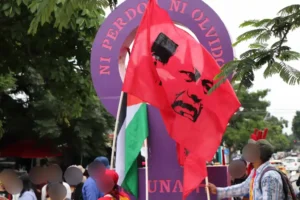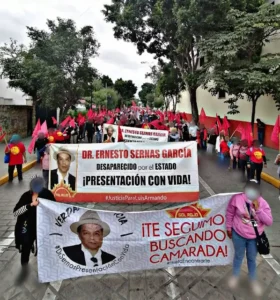
The US Launches Military Intervention in Latin America
We hereby share an unofficial translation of an article published by A Nova Democracia (AND).
Amid the growing imperialist dispute against China and Russia, the United States launched a new military intervention in Latin America today (August 14), sending naval and air forces to the Southern Caribbean Sea. The operation, officially justified as a “war on drugs,” is mainly targeting areas near Venezuela and Colombia, but it is raising concerns about foreign interference, violations of sovereignty, and repression of popular movements in the region.
In an escalation of actions to reaffirm its dominance in Latin America in the face of disputes with China and Russia, the United States (US) today launched a new military intervention in Latin America, sending air and naval forces to the Southern Caribbean Sea. The action, announced earlier this week, will mainly affect the areas surrounding Venezuelan and Colombian territory.
The policy includes sending warships and aircraft for surveillance and military presence in the Caribbean and along borders; increasing the reward to $50 million for information leading to the capture of Nicolás Maduro; and requests from the FBI to local police to include possible suspects linked to cartels on anti-terrorism watch lists.
Mexican President Claudia Sheinbaum has said she will cooperate with the operations, but “without submission or invasion.” These words attempt to disguise a practice of capitulation to imperialism. Just this week, Sheinbaum approved the deportation of Mexican prisoners wanted by the US to Yankee territory for the second time this year. The prisoners transferred are members of cartels, but it cannot be ruled out that in the future the measure will be extended to other groups, including political prisoners.
The military intervention is superficially described as part of the “war on drugs,” but it is part of a deeper plan of aggression against semi-colonial countries. The drug trafficking groups used to justify the intervention, such as the Sinaloa Cartel (Mexico), the Tren de Aragua and MS-13 (Venezuela), have been classified by the government as “terrorists,” a label often used by the US to attack its opponents.
Last year, Ecuador carried out a military intervention in the country supported by US imperialism under the same justification, but with the real purpose of repressing the basic rights of the people. The results were home raids, summary executions of innocent people, and other violations.
The old Yankee plan against the peoples: New faces, same domination
According to sources linked to the New York Times (NYT), which published a report on June 11 about Trump’s permission for intervention, the Yankee president pressured the Defense Department and the Southern Command to authorize clandestine missions by elite units, such as the Navy SEALs and Green Berets, in countries such as Venezuela, Colombia, Bolivia, and even areas of Brazil.
The orders, although they did not lead to open occupation, set dubious legal precedents for the extraterritorial action of US troops, without the full consent of local governments or with consent negotiated in secret with military sectors and the local ruling classes. In some cases, special forces have operated in intelligence, infiltration, and sabotage missions against armed groups linked to drug trafficking, but also against militias and popular movements generically labeled as “threats to regional stability.”
The underlying plan behind these movements is the growing influence of China and Russia in Latin America. While Beijing consolidates its presence through investments in infrastructure and billion-dollar trade agreements, Moscow strengthens its military and strategic ties with countries such as Venezuela and Nicaragua. In response, the US imperialists are once again reinforcing the old Monroe Doctrine of “America for Americans.”
The old charade of the war on drugs returns in a new guise but with the same goal: Imperialist control
Despite official rhetoric, the United States remains the world’s largest consumer market for drugs. Data from the United Nations Office on Drugs and Crime (UNODC) reveal that around 90% of the cocaine produced in Latin America is consumed on US territory or exported through networks that have direct links to banks, front companies, and money laundering channels within the US financial system itself.
Historically, the so-called “war on drugs” has served to justify military interventions such as that in Panama in 1989, the strengthening of local repressive forces, and the criminalization of peasant and popular movements. The most emblematic case was Plan Colombia, which began in the 2000s and injected billions of dollars into the country under the pretext of combating drug trafficking, but which in practice served to attack the guerrillas and consolidate US imperialism’s control over strategic military bases.
Several independent studies and investigations show that the so-called “war on drugs” is actually highly profitable for specific sectors. Major international banks such as HSBC have already been fined for laundering billions of dollars from drug trafficking. In the United States, private prisons, financed by lobby groups, profit from the mass incarceration of small-time drug dealers and users, most of whom are Black and Latino.
In addition, segments of the Latin American ruling classes also profit from drug trafficking, either by facilitating routes, protecting political allies, or cooperating with foreign intelligence agencies.
Domestically, these actions also challenge the limits of presidential power in the United States, as, according to experts at the Center for Strategic and International Studies (CSIS), Trump has ordered operations without going through Congress, disregarding the War Powers Resolution.

